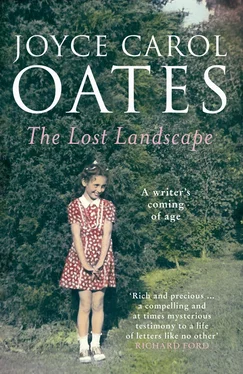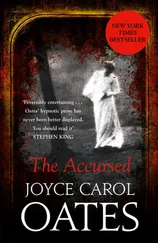1 ...6 7 8 10 11 12 ...17 This was the Grandmother whom Daddy loved—for this Grandmother was Daddy’s mother . The little girl had been told this remarkable fact which she could not comprehend because Daddy was so much taller than the Grandmother it seemed to her silly —that her tall strong Daddy who was so forceful would have a mother.
This was the Grandmother who read books from the Lockport library, never fewer than three books each week. And these books smelling of the library in plastic covers. And these books smartly stamped in dark green ink LOCKPORT PUBLIC LIBRARY. This Grandmother took the little girl hand in hand into the children’s entrance of the library, to secure a library card for the little girl. For here was the surprise, that would be one of the great, happy surprises of the little girl’s life—“Joyce Carol” was old enough for a children’s library card: six. And she was allowed to take out children’s books, picture books, selected by the little girl herself, from shelves in the library—so many shelves! Such beautiful books! The little girl was so excited she could barely speak, to thank the Grandmother. Having her books stamped and discharged by the librarian made the little girl very shy but the Grandmother stood beside her so there was nothing to fear. And the little girl and the Grandmother-who-was-Blanche read these books together sitting on a swing on the front veranda of the gray clapboard house on Grand Street.
In all that day, the little girl did not once think of me.
Those hours, blinking and staring at the beautiful brightly colored illustrations in the books, turning the pages slowly, as the nice Grandmother Blanche read the words on each page, and encouraged the little girl to read too—the little girl did not once think of Happy Chicken.
But when the Mother took the little girl home again to Millersport, in the late afternoon of that day, and the little girl ran out into the barnyard to call for me, there was no Happy Chicken anywhere.
The little girl and the Mother would search the chicken coop, the barn, the orchard. . . . Oh where was Happy Chicken? The little girl was crying, sobbing.
The (Hungarian) Grandmother who was hanging sheets on the clothesline insisted she had not seen Happy Chicken.
The Grandmother had never really distinguished Happy Chicken from any other chicken—the little girl knew that. How ridiculous, the Grandmother thought, to pretend that one chicken was any different from any other chicken!
The Grandfather too insisted he hadn’t seen Happy Chicken! Wouldn’t have known what the damned chicken looked like, in fact. Anything that had to do with the chickens—these were the Grandmother’s chores, and of no interest to the Grandfather who was worn-out from the foundry in Tonawanda and couldn’t give a damn, so much fuss over a goddamn chicken.
When the father returned from his factory work in Lockport in the early evening he was in no mood either to hear of Happy Chicken. He was in no mood to hear his little daughter’s crying, that grated on his nerves. But seeing his little girl’s reddened eyes, and the terror in those eyes, the Father stooped to kiss her cheek.
Don’t cry, he’ll come back. What’s his name—“Happy Chicken”?
Sure. “Happy Chicken” will come back.
SHE IS CALLING HIM-HAPPYChicken. Her throat is raw with calling him —Happy Chicken!
She has wakened in a sick cold sweat tangled in bedclothes. The little red chicken is somewhere in the room—is he? But which room is this, and when?
But here I am—suddenly—crouching at her feet. Eager quivering little red-feathered chicken at the little girl’s feet. The little girl kneels to pet me, and kisses the top of my hard little head, and holds me in her arms, my wings pressed gently against my sides. And the little chicken-head lowered. And the eyelids quivering. Red-burnished feathers stroked gently by a little girl’s fingers.
Where did I go, Joyce Carol? I flew away.
One day that summer, my wings were strong enough to lift me. And once my wings began to beat, I rose into the air, astonished and elated; and the air buoyed and buffeted me, and I flew high above the tallest peak of the old clapboard farmhouse on Transit Road.
So high, once the wind lifted me, I could see the raggedy flock of red-feathered chickens below scratching and pecking in the dirt as always, and I could see the roof of the old hay barn, and I could see the top of the silo; I could see the farthest potato field, and the farthest edge of the pear orchard, and the rutted dirt lane that bordered the orchard leading back to the Weidenbachs’ farm where the big barking dogs lived.
For it was time, for Happy Chicken to fly away.
THE SINGULAR BOOK THATchanged my life—that made me yearn to be a writer, as well as inspired me to “write”—is Lewis Carroll’s Alice’s Adventures in Wonderland and Through the Looking-Glass . This beautiful, slightly oversized book published by Grosset & Dunlap in 1946 was a gift of my (Jewish) grandmother Blanche Morgenstern for my ninth birthday, in 1947. (My book-loving grandmother, my father’s mother, gave me books for birthdays and Christmas and at other times as well, including Frances Hodgson Burnett’s The Secret Garden . Grandma gave me my first typewriter—a toy typewriter—and she gave me a Remington typewriter at the age of fourteen as if foreseeing how I would need it.) To this day I treasure, and keep prominently on a bookshelf in my study, this gift book with its eerily beautiful quasi-“realistic” illustrations by John Tenniel.
The illustrations of Alice amid her bizarre wonderland world depict her as surprised and sometimes intimidated by that world but never overwhelmed by it. The great illustrator Tenniel gave to Alice a commonsensical gravity and a tender sobriety quite unlike most illustrations of children in American, contemporary children’s books; Alice is recognizably a young girl, but she is not childish . There is something responsibly mature in Alice, an inclination to be skeptical, at times, of the adults who surround her; an unwillingness to be bossed around or frightened into submission. Alice is a girl who “speaks her mind”—as few children are encouraged to do, then or now. When I was nine, I was much too young to comprehend the underlying themes of Alice’s astonishing adventures, which have to do with Darwinian evolutionary theory and the principle of “natural selection through survival of the fittest”—a controversial issue of the Victorian era that represented a challenge to conventional Christian theology, one not entirely resolved in the twenty-first century.
Like any child enraptured with a favorite book, I wanted to be the book’s heroine—I wanted to be “Alice.” It must have occurred to me that Alice was very unlike any girl of my acquaintance; she seemed to belong to a foreign, upper-class environment with customs (tea-time, crumpets, queens, kings, footmen) utterly alien to the farming society of Millersport, New York. I think that I learned from Alice to be just slightly bolder than I might have been, to question authority—(that is, adults)—and to look upon life as a possibility for adventures. If I’d taken Alice for a model, I was prepared to recognize fear, even terror, without succumbing to it. There are scenes of nightmare illogic in the Alice books—numerous dramatizations of the anxiety of being eaten, for instance—that suggest the essential gravity of the books, yet Alice never becomes panicked or loses her common sense and dignity.
It did occur to me that Alice is a character in a book—and that Alice was not telling her own story. The author of the book was named in gilt letters on the spine and on the title page: “Lewis Carroll.” Being Lewis Carroll was an aspiration, like being Alice-in-Wonderland, and soon I was drawing stories in the mode of the Tenniel illustrations, not of adults or even children but of cats and red-feathered chickens. These were “novels” on lined tablet paper, that captivated me for long hours as a child. (Decades later I would see facsimiles of the Brontë children’s miniature books, and feel a tug of kinship. The Brontë children may have been lonelier than I was in Reverend Brontë’s remote windswept parsonage in Haworth on the moors of England, though probably they were not more fascinated by storybooks than I was.) Out of Alice’s Adventures in Wonderland and Through the Looking-Glass have sprung not only much of my enthusiasm for writing but also my sense of the world as an indecipherable, essentially absurd but fascinating spectacle about which it is reasonable to exclaim, with Alice—“Curiouser and curiouser!”
Читать дальше












